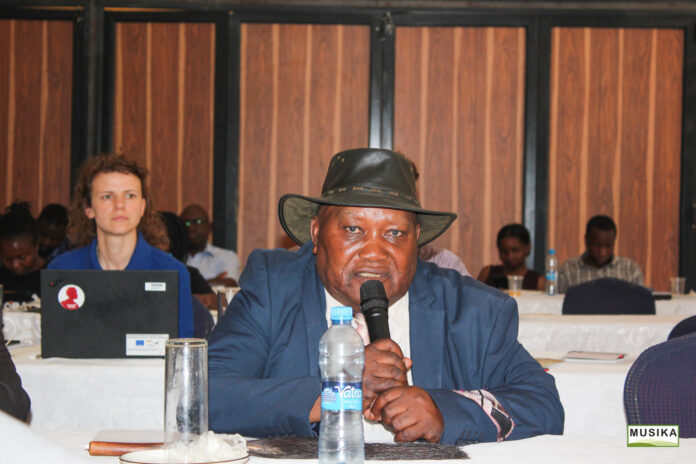Musika, with support from the Embassy of Sweden in Lusaka, facilitated & successfully held a consultative stakeholders’ meeting on effects of deforestation which leads to climate change & actions that can be taken to curb this vice in Southern Province.
The meeting which was held on 27th September in Choma and officiated by Southern Province Minister Cornelius Mweetwa, brought together 16 chiefs from various chiefdoms in the province. Present at the meeting also were government officials, private sector players and Non-governmental Organisations (NGOs) who are also looking at the issues of deforestation, afforestation and agroforestry in Southern Province.
The participants discussed challenges around deforestation and came up with specific activities that could assist sustainably address the problem in the province and ultimately help mitigate the effects of climate change. During the same meeting, Musika also presented information that was gathered from the Focus Group Discussions (FGDs) that were held in 38 chiefdoms of Southern Province, whose objective was to get a common understanding of the extent of the problem of deforestation and possible community-owned solutions.
The following were submissions from the various stakeholders in terms of what the government needs to do to address the problem:
- Sensitize citizens and raise awareness on the detrimental effects of deforestation
through various platforms, especially social media targeting the young population.
- An immediate ban on cutting trees and charcoal burning and suspend the of
issuance of tree cutting permits. The ban on tree cutting should last for up to 10
years to allow for the regeneration of woodlots and tree species in most
communities. In case a full ban is not feasible, charcoal production and tree cutting
should be strictly regulated.
- The government needs to recapitalize the forestry department to ensure that they
can fully enforce the laws and rules around forest management. The forestry
department only works up to 17:00 hours leaving time for illegal logging activities
at night, hence the need to revert to 24/7 work schedules for the department.
- Government should support carbon trading programs (carbon credits) drawing
lessons on the successes of what was done in Eastern Province.
- Government should gazette and protect water catchment areas to avoid streams
drying up. They should put in place laws that prevent timber harvesting from these
areas.
- Government needs to streamline the state laws with traditional laws. They need to
empower traditional leaders to enforce laws that prevent deforestation. As it
stands, traditional laws are not state laws.
- Government needs to engage as many stakeholders as possible in developing
interventions around prevention of deforestation.
- Promotion of tree planting programs is necessary. Both indigenous trees and exotic
ones need to be produced, especially fruit trees. Promotion of fast-growing
bamboo species that produce superior charcoal in a quicker time frame should be
done.
- Govt needs to develop a forest sector fund that will be used for protection of
forests. Money from taxes such as carbon tax need to be channeled to this fund.
- Government needs to also target charcoal users, especially the urban areas, by
providing them with cheaper sources of cooking energy such as efficient cook
stoves, gas stoves, and expediting the rural electrification programme.
- Eco tourism should be encouraged by Govt.
- Govt needs to streamline afforestation and environmental management into
school curriculums in order to start changing behaviours of young people.
- Government needs to encourage citizens on the use of biofuels
Traditional Leaders, Private Sector, and Non-Governmental Organizations
Were Committed to do the following:
- Resource mobilization. The private sector, especially NGOs are willing to mobilize
resources to protect forests
- All parties here were willing to raise awareness to farmers in various chiefdoms on
the detriments of charcoal burning and deforestation and what can be done about
it.
- Traditional leaders willing to be role models to subjects when it comes to
afforestation activities. They committed to show an example to their subjects and
were encouraged to desist from engaging in vices destructive to forests as they
were ambassadors of curbing climate change.
- NGOs were willing to support initiatives that provide alternative livelihoods to
deforesters.
- Traditional leaders willing to help subjects form cooperatives that can tap into CDF
funding for alternative livelihoods.
- Chiefs should lobby to govt to empower chiefs as traditional authority to be part of
law enforcement
- Chiefs need to promote planting trees. Natural barriers and other ways of getting
subjects to plant trees should be promoted
- NGOs are willing to promote and support interventions in chiefdoms that combat
deforestation. Interventions that support carbon credits, bamboo charcoal, and
other afforestation initiatives would be supported.
- Chiefs were committed to intensify enforcement of traditional by-laws and
cultural practices in favour of curbing climate change.
- Stakeholders, especially traditional leaders were willing to support the formation
of community forest management groups.
- Stakeholders were committed to promoting agro-forestry with trees beneficial to
the soils such as Gliricidia among others.
- Chiefs were willing to partner with any stakeholders in sensitizing their subjects
on use of biofuel to reduce charcoal use

